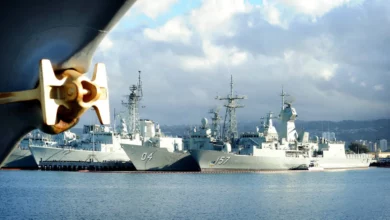
Indonesia will increase maritime patrols after what it called deplorable territorial violations by Australia's navy as it tried to turn back asylum seekers, worsening an already bitter dispute between the two neighbors over the issue.
Earlier on Friday, Australia apologized for a number of recent incursions into Indonesian waters as part of Canberra's controversial policy of pushing back boats carrying would-be asylum seekers entering its side of the sea.
"Indonesia…will intensify its maritime patrols in areas where violations of its sovereignty and territorial integrity are at risk," the political and security coordinating ministry said in a revised statement.
It withdrew an earlier statement which had used a softer tone.
The revised statement called the incursions deplorable, demanding formal diplomatic clarification and assurances that such incidents would not be repeated.
Australian Immigration Minister Scott Morrison said he had been told earlier this week about the "inadvertent breaches" on multiple days and immediately informed the Indonesian navy.
The latest spat comes as often tense relations between the neighbors touched their lowest since the 1990s after allegations late last year that Australia had spied on President Susilo Bambang Yudhoyono and other senior Indonesian officials.
Indonesia downgraded its relations with Australia in November as a result of those allegations, suspending intelligence and military cooperation, including over asylum seekers.
The increasing strain on ties has serious economic implications. Indonesia is a major importer of Australian agricultural products such as wheat and live cattle. Australia is Indonesia's 10th-largest export market.
Morrison's office also said Foreign Minister Julie Bishop had sent a letter to her Indonesian counterpart.
Morrison said Australia "deeply regrets" the breaches of territorial sovereignty but at the same time maintained Australia's right to protect its own borders.
"We have offered the apologies, we have been very clear about what has occurred both with Indonesia and here today," he told reporters.
"But we won't let this setback get in the way of the job we were elected to do, which is stop the boats," he said.
The number of refugees involved pales in comparison with other countries but is a polarizing political issue in Australia and stokes tension with Indonesia over border policies that have been criticized by the United Nations and international human rights groups.
Prime Minister Tony Abbott's conservative government came to power partly because of its tough campaign against asylum seekers after an easing of border policies by the former Labor government that resulted in a rise in the number of boats.
Its policies include offshore detention centers that hold thousands of asylum seekers, many of whom have fled conflicts in Afghanistan, Darfur, Pakistan, Somalia and Syria.
CONCERNS OVER SECRECY
Abbott's government is also coming under fire at home over the secrecy surrounding its "Operation Sovereign Borders" asylum policy, which he recently likened to a war. He has said secrecy is important to prevent "the enemy" receiving information.
On Wednesday, Morrison moved to restrict access to information even further as he touted the operation's success, refusing to confirm reports that the navy had forced the return of a number of boats to Indonesia in recent weeks.
The U.N. refugee agency has asked for information from the government, warning that Australia could be breaking international law if it is forcing boats back to Indonesia without proper regard for refugees' safety.
Graeme McGregor, a spokesman for Amnesty International, called "absurd" Canberra's continued refusal to provide greater information about the policy to the public in the wake of an incursion that he says threatens to derail the regional framework on refugee resettlement.
"I think the public have a right to know how their money is being spent, and I think the current government's policies of secrecy and masking that information are not helpful," he told Reuters.
Many trying to reach Australia pay people-smugglers in Indonesia to make the perilous journey in often unsafe boats.



